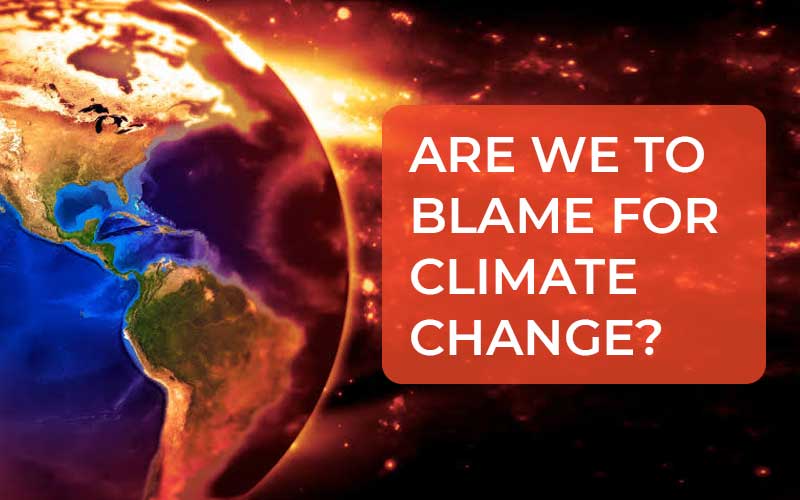
Are we to blame for climate change?
When we talk about climate change, we're talking
about long-term shifts in weather and temperature that have a big impact on the
Earth's ecosystems and its inhabitants. Fossil fuel combustion and
deforestation are two human-caused activities that are major contributors to
the issue. The combustion of fossil fuels like coal, oil, and gas releases
greenhouse gas emissions into the atmosphere, which trap heat from the sun and
contribute to global warming.
Carbon dioxide and methane are the two primary greenhouse gases that cause climate change. Human activities, including transportation, land use, and agriculture, are mostly responsible for the production of these gases.
Since the late 18th century, the temperature of the planet has increased by about 1.1°C, with each decade that followed growing warmer than the one before it. And it is just the beginning, as the Earth is an ever-shifting structure in which changes in one place might have an impact on changes in other places. According to scientific reports, the majority of the recent two centuries worth of global warming has been caused by mankind.
Consequences:
Among the many effects of climate change are increasing sea levels, severe droughts and floods, melting of the polar ice, severe fires, catastrophic storms, and a decrease in biodiversity. These effects have an impact on many facets of human existence, including food security, safety, and health. Particular groups, such as communities belonging to minority regions like island states and poor nations, are more susceptible to the effects of climate change than others.
Causes:
One of the most significant contributors to climate change is human electricity usage. Traditional fuels like coal and natural gas release harmful emissions that contribute to global warming. A shift to renewable energy sources like wind, water, and solar power is slowly being adopted globally and will help mitigate climate change in the long run. The transition to renewable energy can also create jobs, reduce energy costs, and improve air quality.
Another significant contributor to climate change is the rapidly growing world population. As more people enter the world, they put a greater strain on the environment and are responsible for more greenhouse gas emissions. Encouraging and educating individuals to make conscious decisions regarding family size and planning can help control our carbon footprint. This can be done through access to family planning resources, education, and empowering women to make informed choices about their bodies.
Consumerism is also a major force driving climate change. The constant need for new products, greater economic growth, and higher profits lead companies to employ cheap labour and engage in unsustainable practises that are destructive to the environment. We need to adopt a more sustainable style of consumption, focusing on quality over quantity, reducing waste, and supporting companies that engage in sustainable practises.
War and conflict also impact climate change. Wartime operations, the destruction of infrastructure, and forced expulsions lead to large-scale disturbances in ecosystems and a significant increase in greenhouse gas emissions. Encouraging peaceful conflict resolution through dialogue, diplomacy, and international collaboration is crucial to mitigating climate change.
Environmental degradation, such as deforestation, contributes significantly to climate change. Trees absorb carbon dioxide and purify the air, and cutting them down significantly reduces their ability to do so. Therefore, we need to preserve and restore forests, adopt sustainable agriculture practises, and protect natural ecosystems.
In sum, climate change is a serious concern for humanity and calls for immediate and ongoing action. Developing a more sustainable world and reducing its repercussions both require multiple strategies. Our joint efforts to build a better future must prioritise environmental awareness, sustainable consumption, lowering greenhouse gas emissions, protecting nature, fostering peaceful conflict resolution, and promoting ethical family planning. Cutting greenhouse gas emissions is essential for preventing climate change. Sustainable methods should be used instead of practises like burning fossil fuels and deforestation. We can secure a sustainable future for our generation and future generations by embracing an environmentally conscientious way of life.
Disclaimer: The opinions expressed in this article are those of the author's. They do not purport to reflect the opinions or views of The Critical Script or its editor.

Newsletter!!!
Subscribe to our weekly Newsletter and stay tuned.

















Related Comments